![]()
| Post offices in Japan handle
not only letters and packages but also people's savings and even life insurance.
Is this unique to Japan? With 24000 offices throughout Japan, they offer
fairly efficient and reliable service.(I am afraid they are not as efficient
to non-Japanese residents because not many clerks speak any foreign language)
Unfortunately they donft pick up letters from your mail box and send them
for you as postal service in the U.S.A does. How about in your country? |
Comments from visitors
| The post office in Canada does not pick up mail at
people's home mailboxes either. Unlike Japan, our post office does not
have savings accounts for people to deposit money. Too, in Osaka and Tokyo,
the central post offices have a special section which is open 24 hours
a day. Canadian post offices never do that any more. Also, I believe that,
in some places in Japan, the post office delivers the mail on Saturdays.
It has been nearly fifteen or twenty years since we have had Saturday delivery
of mail in Canada. Not to mention that, I Japan, as far as I know, there
have been perhaps two rate increases by the post office in the past eight
or ten years? In Canada, there have been rate increases almost every year
or two. StarWolf |
![]()
| Convenience stores, as
we call combini, have become necessary part of everyday life especially
among young people. They are EVERYWHERE! In fact, I have seen quite a few
places where two combinis stand across the street from each otehr. At combini
(not all combini) you can send faxes, pay utility bills, send packages
through courier companies, have photo developed, make copies and at some
stores of a combini company you can withdraw money from your bank account.(they
just started offering this service recently) However, the thing that has
made people so thankful for the presence of combini is already-made food
that come in plastic boxes. They have all sorts of food available from
onigiri(rice ball wrapped in dried seaweed called nori) to burritto and
always comes up with interesting foods. Though not very nutritiously balanced,
the food in general tastes pretty good. (I have been addicted to them.) |
![]()
| When the weather gets cold, it is time for yakiimo man. Yakiimo, literally meaning baked potato, often refers to baked SWEET potato sold by people driving around in a small truck.. Those vendors have a big primitive oven full of stones on their truck and bury sweet potatoes in those heated stones to roast. As fall deepens, you hear more and more yakiimo man hawking over the speaker. |
![]()
| Personally I don't like
winter because it is COLD! Especially after living in a house in the U.S.A
that is equipped with central heating system, my dislike for winter has
gotten worse. I have heard some people from Canada complain how cold they
feel in winter here and it struck me as kind of odd as Canada is a very
very cold country. But again this may be because of the fact that the central
heating system is not common here at all. We rely mainly on kerosene heaters
that are only capable of warming up a room rather than the whole house.
Around this time of year, you see a lot of empty plastic boxes sitting
in front of houses in residential areas. They are there to be filled with
kerosene by the kerosine man who drives around in a truck just like yakiimo
man above . |
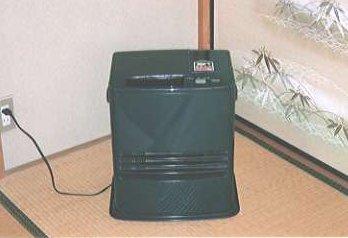 |
A picture of herosene heater typically seen in a Jpaanese house. | 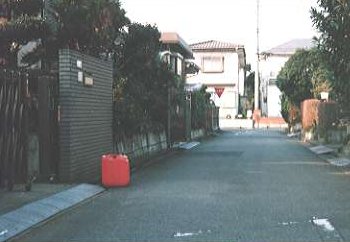 |
Well, on this particular day only one house(mine actually) had the plastic kerosene box outside. |
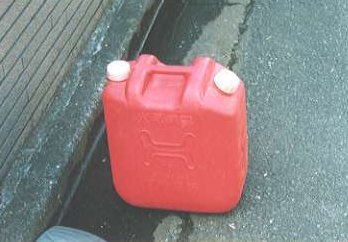 |
Nothing significant... just a plastic box. | 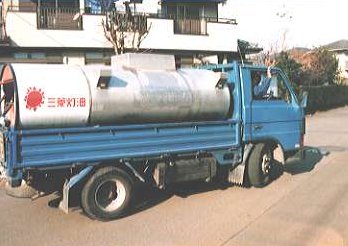 |
This is the kind of truck the kerosene man drives around in.Cool, eh? He is waving at me. |
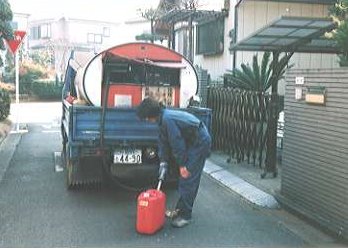 |
The kerosene man filling the box. | 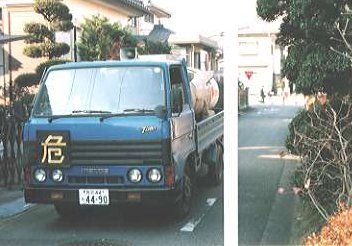 |
They play music to let people know they are nearby |
|
One cold January morning I drove
by a crowd of people gathered on the bank of a river. As usual I got curious
as to what was going on. A closer look revealed that people were surrounding
pots on a table that contained what we call Oshiruko. Oshiruko is a hot,
sweet soup made of red beans that also has grilled mochi (rice cake) in
it. One of the people who was in charge of making Oshiruko told me that
it was held to roughly coincide with a custom called Kagamibiraki (generally
observed on January 11th), in which people eat kagamimochi (See Cultural
Calendar 3) in ozoni (See Cultural Calendar 3) or oshiruko. I learned that
this oshiurko making activity was held by a community group. |
| When you walk down a street in
a city you often see, usually near a train station, a box with a small
window and one or two ladies sitting in it. That's where takarakuji (the
lottery) is being sold. The box is usually affixed to the building of Daiichikangyo
bank (who are the trustees.),but sometimes you see independent takarakuji
vendors as well. Every year about 500 different lottery games are played
throughout Japan. The winning prizes are not as big compared to the ones
in the U.S or Australia (How much is the payout in your country? The biggest
cash prize I have heard given away in Japan is 300 million yen.), but the
popularity of the lottery in Japan is outrageous!!! According to a statistic
by the Japan lottery Association, during April 1996-Mar 1997, over 3.2
billion tickets were sold, which amounts to every single person in Japan
buying 26 tickets in that year!!! |
|
|
If you visit a rural or
suburban type of area, you might bump into a wooden booth with shelves
of fresh vegetables displayed on it. These booths are left unattended.
(We call these booths "mujin yasai hanbaijo". It's an attempt
by some farmers who want to deliver fresh veggies directly to consumers
instead of using a "middleman". Since many farmers don't have
time or enough products to own their own produce store, their unattended
vegetable booths seem to be a great way to make extra yen. Some "mujinn
yasai hanbaijo" are so popular that their products are sold out within
a few hours!!! Some of my friends have expressed their disbelief at the sight of many local retail stores displaying some of their merchandise in front of their stores, next to the street. The friends thought it was outrageous that no one tries to steal them. Is that kind of stores(along with unattended booths like in the pictures) ultimate examples of the trusting nature of Japanese people??? |
Comments from visitors
| My Most Favorite Thing in Japan is the cheap clear
plastic umbrellas that all the convenience stores sell, and the "parking racks" for umbrellas at many public places. I visited Japan during the summer rainy season, and these were a godsend. I don't understand why this hasn't caught on in rainy countries in the West (like in Ireland, where I lived for a while -and boy does it rain there!) In New York City, umbrella vendors appear like magic on a rainy day selling 5-dollar umbrellas that usually explode with the first gust of wind and you have to eat lunch sitting next to your wet umbrella because if you put it in a rack you may never see it again. P.S.- Your pictures of the yakiimo vendor and the roadside vegetable stands remind me of stories from my childhood... I grew up and still live on Long Island , N.Y., and when I was a kid, we had a farm just around the corner from us with a vegetable stand run by an old Italian lady and her son. If one of them wasn't outside, you could leave your money, but we always felt better ringing the doorbell to let them know what we wanted to buy. We also used to have a knife-sharpener come around in a truck ringing a special bell and you could run out and he would sharpen all your knives on a stone wheel right there on the street. In my Mom's day (circa 1930's), they had the milkman who also sold eggs, the iceman, guys who sold watermelon in Summer, and also vegetable men with horse-drawn carts. Some of the horses knew the route so well that the men could go door to door on the sidewalk and the horse followed them in the street with the cart. My dad talks about roasted regular potatoes when he was a kid ( they called them"Mickeys", which also was a not- too -nice name to calll an Irishman) and we still have vendors in New York who sell roasted chestnuts starting in the Autumn through the Winter, and also hot soft pretzels year-round. This is all traditional New York stuff, but nowadays there 's all kinds of food vendors from all kinds of countries. This all depends on what ethnic neighborhood you visit. I have even seen a Yaki-imo guy in a Korean neighborhood, but right now our neighborhood only has the icecream truck in the summertime which plays kiddie songs over a louspeaker so you know he's coming. Thanks for a lovely website, Maria Eng |
| To Everyday Scenes 3 |
| Back to Everyday Scenes 1 |
| HOME |
![]()